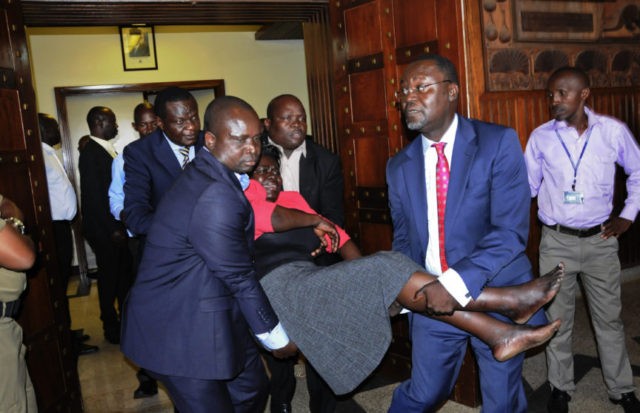KAMPALA, Uganda (AP) — A government-backed Ugandan lawmaker introduced a measure Wednesday to extend the long-time president’s rule, following a fight in which opposition lawmakers were forcibly evicted from the legislative chamber.
The evictions came after the parliamentary speaker, a member of the ruling party, accused some lawmakers of obstructing proceedings in a riotous session Tuesday during which legislators brawled over efforts to introduce legislation to remove the presidential age limit of 75 from Uganda’s constitution.
Footage from the legislative chamber showed some opposition members of parliament being physically manhandled and dragged out by plainclothes security officials. The leader of the opposition, after complaining that special forces had been used to evict her colleagues, later led her team in walking out.
President Yoweri Museveni, who is 73 and has ruled Uganda since taking power by force in 1986, is ineligible to run again in 2021 if the age barrier stays.
The draft legislation must be published in the government gazette before it is debated in the National Assembly.
The move to jettison the age limit is widely seen as an effort by Museveni to extend his rule. Museveni himself has ducked the question of whether he is interested in more time in office, saying recently that the matter is not so important. But critics say behind the scenes he is orchestrating the move by lawmakers to remove the last hurdle to extend his presidency, possibly to rule for life.
Presidential term limits were removed from Uganda’s constitution in 2005.
Uganda’s ruling party enjoys an overwhelming majority in the national assembly and the bill is expected to pass.
The country’s media regulator Wednesday restricted live coverage of parliamentary sessions, leading local television channels to stop broadcasting a live feed. Amnesty International criticized the regulator’s threat to revoke or suspend the licenses of noncompliant media organizations.
“These threats, harassment and intimidation are an attempt to gag the media, and have no place in any society that respects human rights,” Michelle Kagari, an Amnesty official in East Africa, said in a statement Wednesday. “The media must be left alone to independently inform and educate the public, including on the ongoing debates about the proposed constitutional amendment.”
Police have violently broken up street demonstrations protesting the effort to amend the constitution, arresting scores since the past week.
Erias Lukwago, the mayor of the Ugandan capital of Kampala, told reporters he is getting medical care after police officers allegedly “squeezed” his genitals while arresting him outside his house last week.
Museveni, a U.S. ally on regional security, took power by force in 1986 and was re-elected last year in a poll marred by allegations of fraud and voter intimidation.
Although Museveni warned in the past that Africa’s problem was leaders “who want to overstay in power,” he has since said he was speaking about leaders who were not elected.
Uganda has never seen a peaceful change of power since independence from Britain in 1962.

COMMENTS
Please let us know if you're having issues with commenting.